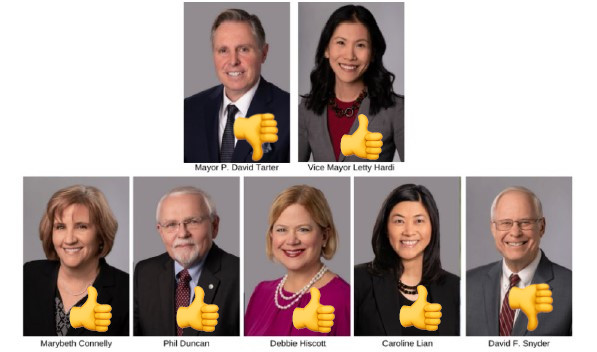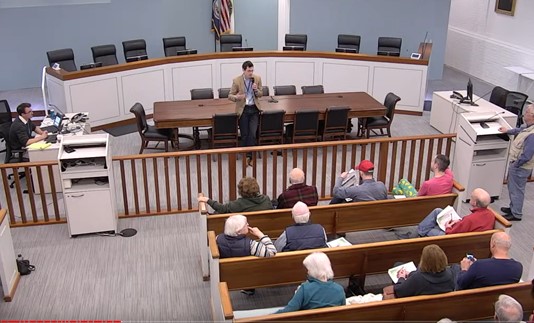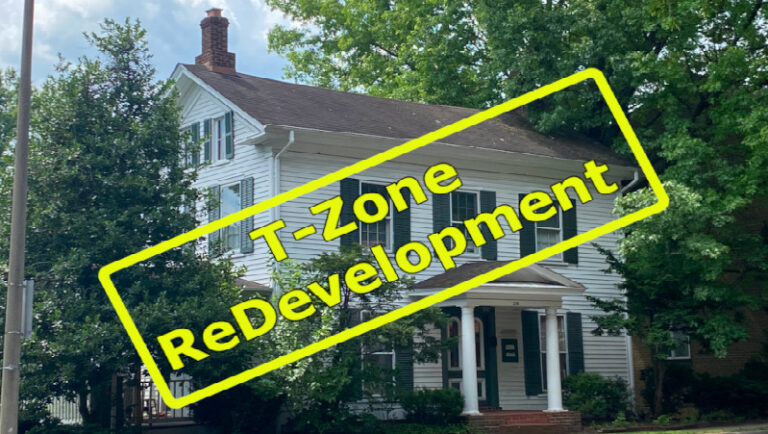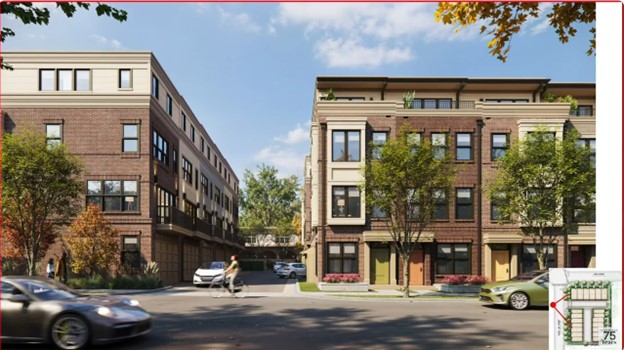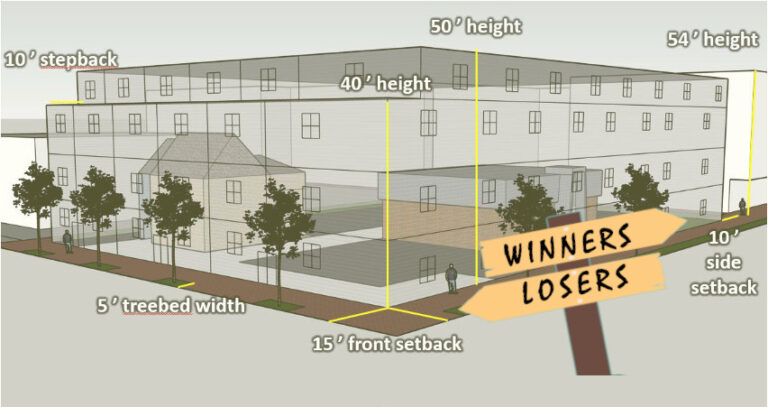A New T-Zone Code Approved (5-2) Despite Lack Of Consensus
Approval of the new T-Zone code
At its September 26, 2023, City Council meeting, Council members voted 5 to 2 to approve the new T-Zone code. The votes were the same as that for the first reading of this new proposal on August 7, 2023: Council members Marybeth Connelly, Phil Duncan, Letty Hardi, Debbie Hiscott and Caroline Lian voted for the proposal and Council member David Snyder and Mayor David Tarter were against the ordinance. This new T-Zone code will be in effect next year (2024).
The approval comes despite many City elders who have served on the City Council and Planning Commission coming out against the ordinance and writing lengthy letters to explain their reasons. They include Marty Meserve (former Planning Commission chair and Vice Mayor), Alan Brangman (former Mayor and member of the Planning Commission), Nader Baroukh (former Mayor), and John Gannon (former City Council member and Planning Commission chair).
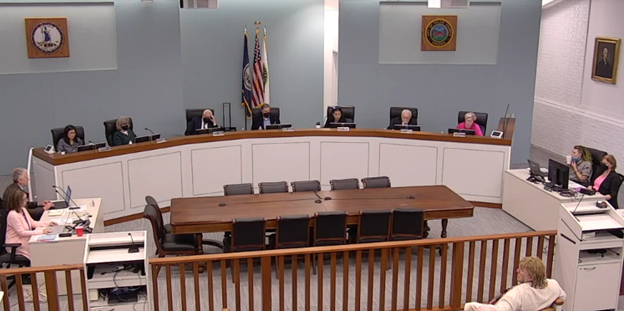
Divisions in the Falls Church City community
The outcome of the night’s vote was expected. Positions on Council had hardened over the past two years. Even as the goals of the proposal changed from increasing affordable housing to increasing the diversity of housing, the community proponents for the change continued to support the ordinance in their strong belief that the City needs to increase its housing density because of a national and regional housing crisis.
Opponents in the community advocated for changes to be made to the new T-Zone code. They, including Planning Commissioner Derek Hyra who has been a strong advocate for affordable housing, were dubious that any impact on affordable housing would be made. They advocated for more modest dimensions because of concerns that the new specifications for building size, setbacks, and density would result in developments that would forever change the character of Park Avenue, leading to more traffic, less tree canopy, and reduced open space. There was also concern that the ordinance would result in the redevelopment of the dwindling number of historic properties in the City. Council rejected the Planning Commission’s amendment to remove them from this ordinance through a map amendment.
Instead of evolving to a state of greater consensus and reconciliation, as had been typical in past proposals (a recent example is the East End Small Area Plan proposal), the community remained firmly divided on this ordinance. It did not help that the Falls Church New-Press editor also jumped in to accuse opponents of NIMBYism, and Vice Mayor Hardi and some Council members presumed the T-Zone opponents had misconceptions or simply did not understand the code.
Rebukes, Defense, And Some Reconciliation From City Council
Each Council member spoke in turn before voting on the T-Zone proposal. Most repeated their reasons for supporting or opposing the proposal as they did during the August 7, 2023, meeting, the first reading of the latest T-Zone proposal. Proponents argued that the new code will encourage a diversity of housing such as townhouses and two-over-twos in a target price range. They said that additional housing will free up lower priced housing in the City, indirectly making more affordable housing available. Opponents maintained that the proposed code still has open issues and gives away too much to developers by-right. (“By-right” refers to the automatic permission to build so long as all the code constraints are met.) They argued that the risk of unexpected negative consequences is too high. (Please read the FCP post, here, for more details.) Sharp words were exchanged reflecting the divisive nature of this entire process.
Mr. Snyder put forward a motion to table the ordinance. This failed on a 2-5 vote. He criticized the use of a regional housing requirement as bogus. He said, “Citing the need for diversity of housing is a bad joke with 1,600 new rental units already built in recent years, with more to come.” Mr. Tarter later added that there were some 1,000 housing units currently under development in the City. (An analysis of the mixed-use developments and their housing units and impacts can be found in the FCP post “Falls Church City Mixed Use Development Projects”.) Mr. Snyder pointed to the input from developers that staff used to craft this proposal. He said that Council members pushing this proposal over significant public requests for improvements offers a clear example of government “of special interests, by special interests, and for special interests.”
Ms. Hiscott rose to the defense of Council members and City staff saying that staff was neither rushed, unethical, nor unscrupulous. She also defended criticism of the process being top-down as Council members have open office hours for people to speak to them, numerous Council meetings have been held on this topic, and she herself has met with many people. Referring to the hundreds of people who have spoken against the T-Zone proposal versus the few tens of supporters, she said people come out to speak when they are opposed so that it is mathematically difficult to know the level of support for these changes.
Ms. Hardi underscored how this new T-Zone code improved on aspects of the current code and was never designed for affordable housing. She concluded that the opposition’s ongoing concerns, despite all her explanations, are based on fear, emotional and not rational, – fear of the unknown, fear of change, fear of unintended consequences. She contended that opponents’ fear is rooted in misconceptions and the mindset of scarcity – scarcity of parking, classrooms, congestion, and property values going down.
In contrast, Mr. Duncan said that he had found the T-Zone debate to be interesting and thoughtful, by and large. He thanked the community for the measured way in which comments were delivered. He said that nothing good comes without controversy, and the City had made good progress with affordable living and elderly housing efforts, but this has not been true for middle-level income couples.
Mr. Tarter was sterner in his defense of the community who advocated for changes to the proposal. “I would also just say, the general notion that people who don’t agree with what’s being proposed are somehow irrational, that they don’t understand what’s being proposed, that they should think about it some more, I find it condescending to the constituents as a whole. “
Ms. Lian affirmed that density is a noble objective, but also struck a conciliatory note, “I am so proud to be a citizen of a community that is so vocal and comes to City Council meetings with passion to express what their thoughts are, and all of us have this commonality of bringing to the table a passion for what this City is going to be.”
Ms. Connelly said that the issue had been unnecessarily divisive. She tried to assure the community regarding Park Avenue. “We are not going to build the Spectrum [offices] again, we made sure of that…”. However, Mayor Tarter later noted that, “The back of the Spectrum is not far off from what this [T-Zone code] will allow. …. [On the Park Avenue Great Streets project] we fretted a lot about tree roots and whether to increase the sidewalk width. Well, this thing isn’t going to do any of that stuff. This thing is currently out of scale for the properties that currently exist on this beautiful street. “
Taking Risks On By-Right Development
For residential developments, the new T-Zone code has features that are unusual, even experimental, for an ordinance. The intent is to put “guardrails” to get housing within a target price of around $800,000 to $900,000 by increasing density and reducing the size of units. Council members acknowledged there were risks surrounding whether this will work. As with the Planning Commission (see Planning Commission Votes (4-2) To Approve T-Zone Proposal), those who voted for the proposal were willing to bet that the risks will pay off, while those against believe the risks are too high.
Mayor Tarter, the only commercial real estate attorney among the Council members, had strongly cautioned that the ordinance was far too generous to developers, and resulted in the City losing leverage to negotiate with developers. Mr. Duncan acknowledged the Mayor’s concern. He said that on past projects, the risks have paid off, although the City did have the ability to negotiate on those projects. Mr. Duncan said, “There is risk to the plan we are laying out here in that the City would give up a certain amount of control in the by-right development situation. It’s just honest intellectually to acknowledge that. So my question is, when we take risk, is it experience-based? Is it needs-based? I think in this case it is.”
Mayor Tarter did not share his view. He repeated his concerns that the proposal was rushed and not ready, resulting in huge risks. For example, punting the issue of historic properties to a future date leaves them exposed to the risk of redevelopment, for the new ordinance makes their land much more valuable. He said, “I have spent decades working in private development. It’s what I do, it’s my career. I will just say that developers aren’t always thinking the same way the community is, aren’t always thinking the same way as what City Council folks do, …lots of unintended consequences that you really can’t consider… Having the preponderance of this development occur by-right, it takes the guardrails off.” He favored more stringent by-right rules so more developments would require the Special Use Permit process. “With negotiations, we get a whole lot of things we will never get in by-right development. I’ve done this long enough professionally… we think we can exactly, precisely know what’s going to happen; we can’t.”
Video clip of the City Council members comments before the vote(42m):
References:
- September 26, 2023 Planning Staff Report, (TO23-11) Ordinance to Amend Chapter 48 “Zoning” to Include an Average Unit Size and Density Restrictions in the T-1 Transition Zone; Eliminate Single Family and Two Family residential Use Therein; Allow for a Townhouse, Apartment and Condo option and Allow for Expanded Lot Coveragehttps://fallschurch-va.granicus.com/MetaViewer.php?view_id=2&clip_id=2427&meta_id=125750
- September 26, 2023, City Council Meeting, https://fallschurch-va.granicus.com/player/clip/2427?view_id=2&redirect=true&h=0c1844924ce667ecbf578a82922ab646. This official video recording will not display properly on mobile devices because it contains an agenda attachment.
- September 26, 2023, City Council Meeting, https://www.youtube.com/watch?v=vIhHR6oJ0eA&ab_channel=CityofFallsChurchGovernment
- Nicholas Benton, Falls Church News-Press, April 27, 2023, Editorial: NIMBYs & F.C.’s T-Zones, https://www.fcnp.com/2023/04/27/editorial-nimbys-f-c-s-t-zones/

